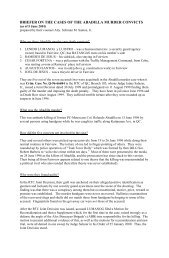Republic of the Philippines - Campaign
Republic of the Philippines - Campaign
Republic of the Philippines - Campaign
You also want an ePaper? Increase the reach of your titles
YUMPU automatically turns print PDFs into web optimized ePapers that Google loves.
APPELLANTS’ BRIEF<br />
People <strong>of</strong> <strong>the</strong> <strong>Philippines</strong> vs. Fortuna, et. al.<br />
S. C. G. R. No. 141660-64<br />
It turns out that <strong>the</strong> trial court itself actually relies on news reports, as shown in<br />
ano<strong>the</strong>r passage <strong>of</strong> <strong>the</strong> appealed Order dated January 25, 2000 (p. 4, second par.): “…as<br />
surely as she have (sic) seen on t.v., as she claimed, and also on <strong>the</strong> morning papers <strong>the</strong><br />
faces <strong>of</strong> all <strong>the</strong> accused…” In an earlier passage (p. 3, fifth par.), <strong>the</strong> trial court referred<br />
to “ <strong>the</strong> time when <strong>the</strong> ambush-slay <strong>of</strong> <strong>the</strong> victim as well as <strong>the</strong> arrest <strong>of</strong> <strong>the</strong> <strong>the</strong>n suspects<br />
(including Joel) was <strong>the</strong> talk <strong>of</strong> <strong>the</strong> town.” And that was because <strong>of</strong> news reports and<br />
o<strong>the</strong>r media coverage. The trial court is, <strong>the</strong>refore, estopped from denigrating news<br />
reports as “hearsay and not admissible in evidence.”<br />
Media interviews where interviewees freely, voluntarily and spontaneously make<br />
admissions or confessions are admissible in evidence, as ruled in <strong>the</strong> recent death penalty<br />
case <strong>of</strong> Pablito Andan (People vs. Andan, 269 SCRA 95; see also People vs. Vizcarra,<br />
115 SCRA 743). If such evidence can be admitted against <strong>the</strong> declarant to <strong>the</strong> point <strong>of</strong><br />
making him liable by death penalty, with more reason can such evidence be admitted to<br />
save innocent accused from <strong>the</strong> death penalty.<br />
Such declarations against penal interest have also been considered exceptions to<br />
<strong>the</strong> hearsay rule and thus admissible to exculpate <strong>the</strong> accused. The best exposition on this<br />
is Philippine jurisprudence was in a decision by <strong>the</strong> great Justice Malcolm:<br />
Any man outside <strong>of</strong> a court and unhampered by <strong>the</strong> pressure <strong>of</strong> technical<br />
procedure, unreasoned rules <strong>of</strong> evidence, and cumulative authority, would say that if a<br />
man deliberately acknowledged himself to be <strong>the</strong> perpetrator <strong>of</strong> a crime and exonerated<br />
<strong>the</strong> person charged with <strong>the</strong> crime, and <strong>the</strong>re was o<strong>the</strong>r evidence indicative <strong>of</strong> <strong>the</strong><br />
truthfulness <strong>of</strong> <strong>the</strong> statement, <strong>the</strong> accused man should not be permitted to go to prison or<br />
to <strong>the</strong> electric chair to expiate a crime he never committed. Shall judges trained and<br />
experienced in <strong>the</strong> law display less discerning common sense than <strong>the</strong> layman and allow<br />
precedent to overcome truth. 23 (italics supplied)<br />
23<br />
People vs. Toledo and Holgado (51 Phils. 825, 839) which has a number <strong>of</strong> o<strong>the</strong>r passages relevant to <strong>the</strong> case at bar, including quoted<br />
paragraphs from Pr<strong>of</strong>essor Gilmore’s classic Book on Evidence. See also People vs. Surio (56 Phil. 774) and People vs. Caparas<br />
(102 Phil. 787).<br />
Page 115 <strong>of</strong> 127<br />
115




